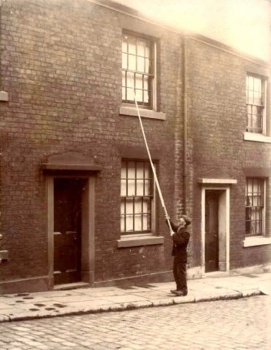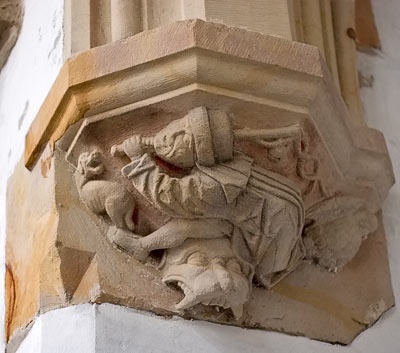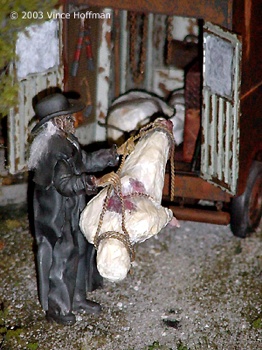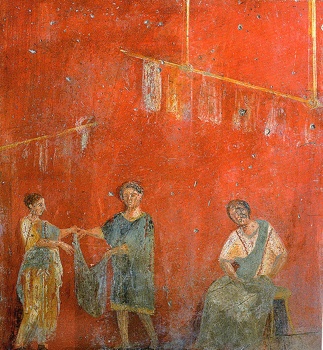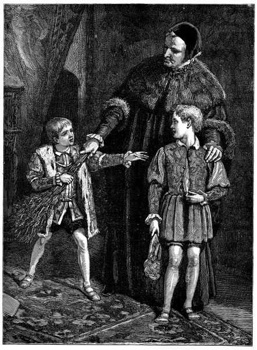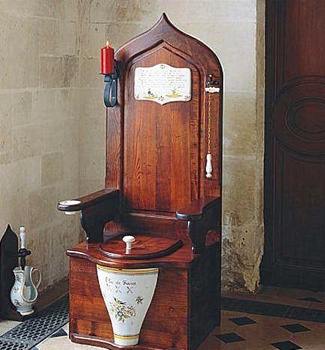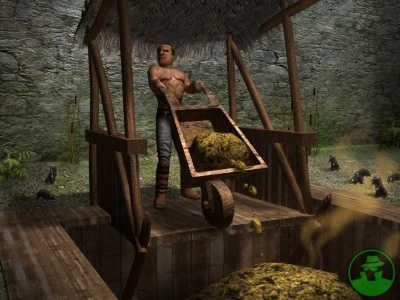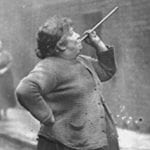 History
History  History
History  Health
Health 10 Everyday Activities That Secretly Alter Consciousness
 History
History Top 10 Historical Disasters Caused by Someone Calling in Sick
 Animals
Animals 10 New Shark Secrets That Recently Dropped
 Movies and TV
Movies and TV 10 Forgotten Realities of Early Live Television Broadcasts
 Technology
Technology 10 Stopgap Technologies That Became Industry Standards
 Weird Stuff
Weird Stuff 10 Wild Facts About Taxidermy That You Probably Didn’t Know
 Travel
Travel 10 Beautiful Travel Destinations (That Will Kill You)
 Miscellaneous
Miscellaneous 10 Modern Marriage Rituals Born from Corporate Branding
 Weird Stuff
Weird Stuff Ten Bizarre Visions of 2026 from Fiction
 History
History 10 “Modern” Problems with Surprising Historical Analogs
 Health
Health 10 Everyday Activities That Secretly Alter Consciousness
 History
History Top 10 Historical Disasters Caused by Someone Calling in Sick
Who's Behind Listverse?

Jamie Frater
Head Editor
Jamie founded Listverse due to an insatiable desire to share fascinating, obscure, and bizarre facts. He has been a guest speaker on numerous national radio and television stations and is a five time published author.
More About Us Animals
Animals 10 New Shark Secrets That Recently Dropped
 Movies and TV
Movies and TV 10 Forgotten Realities of Early Live Television Broadcasts
 Technology
Technology 10 Stopgap Technologies That Became Industry Standards
 Weird Stuff
Weird Stuff 10 Wild Facts About Taxidermy That You Probably Didn’t Know
 Travel
Travel 10 Beautiful Travel Destinations (That Will Kill You)
 Miscellaneous
Miscellaneous 10 Modern Marriage Rituals Born from Corporate Branding
 Weird Stuff
Weird Stuff Ten Bizarre Visions of 2026 from Fiction
Top 10 Strangest Jobs In History
In the good old days before electricity and massive industry, many jobs that now require no or little labor, were undertaken by humans. This list looks at ten jobs that are now (mostly) extinct. Each job contains at least one element of the bizarre. Be sure to add your own favorites to the comments.
We have all heard of the court Jester – the fool who was permitted to insult the king without losing his head – as long as it made the king laugh. It was a job that came with accolades and with fear. It is also a job unlike any existent today. How many families do you know that employ a private “comedian” so to speak? But, while the job did vanish from history for hundreds of years, as recently as 1999 one Kingdom (Tonga) has appointed an official jester. In a bizarre (and very amusing) twist, the man appointed happened to also be the government’s financial advisor. He was later embroiled in a financial scandal. The American jester to the Tongan court was Jesse Bogdonoff and he is pictured above.
A tosher was someone who scavenges in the sewers, especially in London during the Victorian period. The toshers decided to cut out the middle man and it was a common sight in 19th Century Wapping for whole families to whip off a manhole cover and go down into the sewers, where they would find rich pickings. As most toshers would reek of the sewers, they were not popular with the neighbors. Similarly, the mudlarks were people who would dredge the banks of the Thames in the early morning when the tide was out. They would have to wade through unprocessed sewerage and even sometimes dead bodies in order to find little treasures to sell. In a kind of weird twist, this is now the popular hobby of some middle class Londoners who travel the banks to clean up trash.
A Knocker-up was a profession in England and Ireland that started during and lasted well into the Industrial Revolution, before alarm clocks were affordable or reliable. A knocker-up’s job was to rouse sleeping people so they could get to work on time. The knocker-up often used a long and light stick (often bamboo) to reach windows on higher floors. In return, the knocker-up would be paid a few pence a week for this job. The knocker-up would not leave a client’s window until they were assured the client had been awoken. This all leads to the obvious question: who knocks up the knocker-up?
Toad doctors were practitioners of a specific tradition of medicinal folk magic, operating in western England until the end of the 19th century. Their main concern was healing scrofula (then called “the King’s Evil,” a skin disease), though they were also believed to cure other ailments including those resulting from witchcraft. They cured the sick by placing a live toad, or the leg of one, in a muslin bag and hanging it around the sick person’s neck. Needless to say this job would also require growing or gathering up a large collection of toads, and in the case of doctors who used just the leg, chopping their legs off to give to their patient.
A dog whipper was a church official charged with removing unruly dogs from a church or church grounds during services. In some areas of Europe during the 16th to 19th centuries it was not uncommon for household dogs to accompany – or at least follow – their owners to church services. If these animals became disruptive it was the job of the dog whipper to remove them from the church, allowing the service to continue in peace. Dog whippers were usually provided with a whip (hence the title) or a pair of large wooden tongs with which to remove the animals. They were generally paid for their services, and records of payments to the local dog whipper exist in old parish account books in many English churches.
In Britain, the crime of snatching a body was only a misdemeanor and so was punishable by a small fine only. This led to a huge industry in body snatching in order to provide corpses to the blossoming medical schools of Europe. One method the body-snatchers used was to dig at the head end of a recent burial, digging with a wooden spade (quieter than metal). When they reached the coffin (in London the graves were quite shallow), they broke open the coffin, put a rope around the corpse and dragged it out. They were often careful not to steal anything such as jewelry or clothes as this would cause them to be liable to a felony charge. During 1827 and 1828, some Edinburgh resurrectionists including Burke and Hare changed their tactics from grave-robbing to murder, as they were paid more for very fresh corpses. Their activities, and those of the London Burkers who imitated them, resulted in the passage of the Anatomy Act 1832. This allowed unclaimed bodies and those donated by relatives to be used for the study of anatomy. This effectively ended the body snatching business.
Fulling is a step in woollen clothmaking which involves the cleansing of cloth (particularly wool) to eliminate oils, dirt, and other impurities, and making it thicker. In days gone by, the fullers were often slaves. In Roman times, fulling was conducted by slaves standing ankle deep in tubs of human urine and cloth. Urine was so important to the fulling business that urine was taxed. Urine, known as ‘wash’, was a source of ammonium salts and assisted in cleansing and whitening the cloth. By the medieval period, fuller’s earth had been introduced for use in the process which ameliorated the process and removed the need for urine.
A whipping boy, in the 1600s and 1700s, was a young boy who was assigned to a young prince and was punished when the prince misbehaved or fell behind in his schooling. Whipping boys were established in the English court during the monarchies of the 15th century and 16th century. They were created because the idea of the Divine Right of Kings, which stated that kings were appointed by God, and implied that no one but the king was worthy of punishing the king’s son. Since the king was rarely around to punish his son when necessary, tutors to the young prince found it extremely difficult to enforce rules or learning. Whipping boys were generally of high birth, and were educated with the prince since birth. Due to the fact that the prince and whipping boy grew up together since birth, they usually formed an emotional bond. The strong bond that developed between a prince and his whipping boy dramatically increased the effectiveness of using a whipping boy as a form of punishment for a prince. The idea of the whipping boys was that seeing a friend being whipped or beaten for something that he had done wrong would be likely to ensure that the prince would not make the same mistake again.
The Groom of the Stool was a male servant in the household of an English monarch who, among other duties, “preside[d] over the office of royal excretion,” that is, he had the task of cleaning the monarch’s anus after defecation. In the early years of Henry VIII’s reign, the title was awarded to minions of the King, court companions who spent time with him in the Privy chamber. These were the sons of noblemen or important members of the gentry. In time they came to act as virtual personal secretaries to the King, carrying out a variety of administrative tasks within his private rooms. The position was an especially prized one, as it allowed one unobstructed access to the King’s attention. Despite being the official bum-wiper of the king, the Groom of the Stool had a very high social standing.
A gong farmer or gongfermor was the term used in Tudor England for a person who removed human excrement from privies and cesspits, gong being another word for dung. Gong farmers were only allowed to work at night and the waste they collected, known as night soil, had to be taken outside the city or town boundaries. As flushing water closets became more widely used, the profession of gong farming disappeared. A latrine or privy was the toilet of the Middle Ages. A gong farmer dug out the cesspits and emptied the excrement. Gong farmers were only allowed to work between 9 pm and 5 am, and were permitted to live only in certain areas, for reasons that should not be too elusive. Due to the noxious fumes produced by human excrement, coroners’ reports exist of gong farmers dying of asphyxiation. This was obviously a shit job to have.
Text is available under the Creative Commons Attribution-ShareAlike License; additional terms may apply. Text is derived from Wikipedia.


